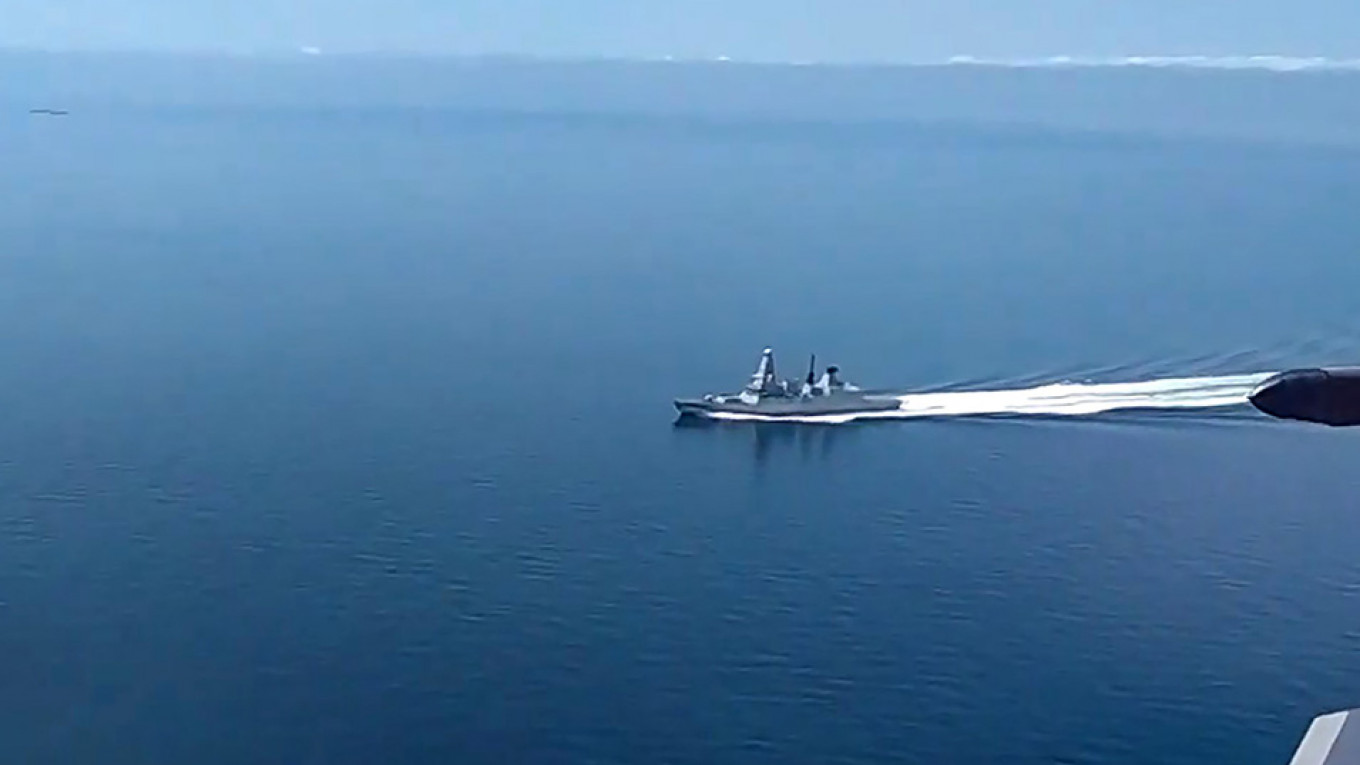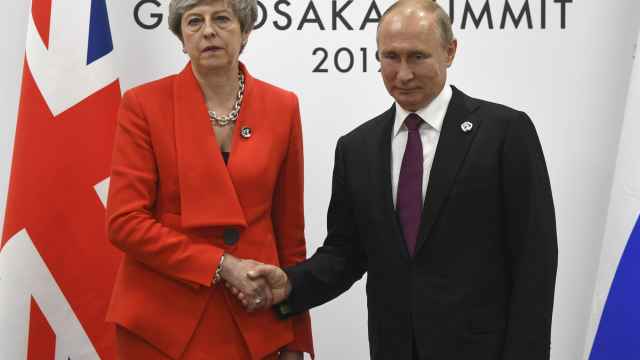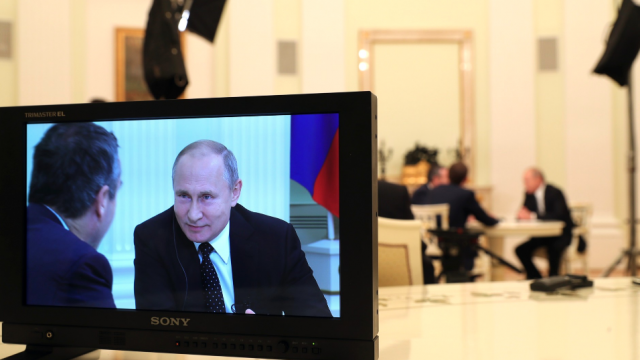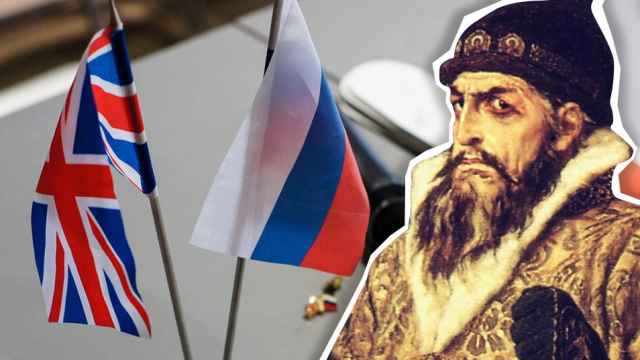There was a certain dramatic inevitability to yesterday’s spat in the Black Sea when the Royal Navy destroyer HMS Defender took advantage of an internationally recognized sea lane passing Crimea’s Cape Fiolent.
London knew that this was a challenge to Russia’s annexation of the peninsula. Indeed, a strong reason for making this journey from Odessa was to reaffirm the illegality of the annexation, and Britain’s commitment to Ukraine’s unity and sovereignty as well as the primacy of international law — just calling these waters its own, does not make them Russian.
It also knew that Moscow would respond, as it has in the past, with attempts to divert the ship from its route and then fanciful claims that an “intruder” was sent packing with his tail between his legs.
Likewise, Moscow knew that this is really just about ritual challenge and response, that the Royal Navy was no more looking for a real fight than the Russians could afford to start a shooting war with NATO.
Instead, the Kremlin was seeking to affirm its determination to retain and defend Crimea and to try and frame the U.K. as, whatever the inherent contradiction, at once a has-been and a sinister threat to Russia.
This is, after all, the age of “discursive statecraft,” in which nations seek to gain advantage by framing themselves in positive terms and their rivals in correspondingly negative ones. Even before the latest confrontation, this was already evident in Defender’s mission, but the media coverage that followed yesterday’s clash is telling in what it says about Russian goals and sensitivities.
Moscow claimed that Defender had been warned off by FSB Border Guard ships. When it ignored these radio messages, it was treated first to warning shots from the boats, then to four 250-kg bombs dropped by Su-24 bombers in its path. At this point, it sheared away and left “Russian waters.”
The British, by contrast, say that while some gunfire was heard, there did not seem to have been any warning shots directed at the destroyer, such that it was assumed this could have been connected to a pre-notified gunnery exercise in the area. As for dramatic tales of bombs being dropped — which would have been a serious escalation on past posturing — while there were aircraft shadowing Defender, that is wholly denied. Nor did the ship change course — it simply completed its pass of Crimea.
A BBC journalist on board Defender corroborated the official British line, and so far, no documentary evidence has been provided by the Russians backing their account.
Narrative angles
The Russian media coverage has run the gamut from essentially neutral reporting that simply cites the respective accounts — although unsurprisingly giving more space to Moscow’s — to rather more excitable coverage that highlights several narrative lines.
First of all, there is the belief that this is not just a “provocation” but one driven by belligerent forces seeking to prevent any new détente. This is explicitly the line taken by Konstantin Kosachev, Deputy Speaker of the Senate and a frequent commentator on international affairs. In the government newspaper Rossiiskaya gazeta, he asserted that it was intended “to prevent the recent reconciliation of positions and approaches, which was made by the presidents of Russia and the United States at the Geneva summit.”
Apart from the fact that Defender’s mission was not a spur-of-the-moment improvisation following the recent summit, this speaks to the grand conspiratorial narrative that sees a military-industrial complex or whichever other shadowy presence of the moment seeking to escalate tensions and demonize a poor, misunderstood Russia. This has depressingly deep roots, redolent of the Soviet-era cartoons where missile-fingered Western militarists were presented as the enemy of all humanity.
This also connects with Russia’s fraught Anglophile-Anglophobia, whereby Britain is somehow still seen as a moth-eaten old imperial lion — a “‘small island no-one pays attention to” as presidential spokesman Dmitry Peskov is meant to have said, although he denies it — and a ruthless and aggressive enemy.
Moskovskii komsomolets, for example, ran an interview with a Russian naval officer that called it a “typically British provocation” because they were “chosen” — again, these shadowy militarists — “for the role of provocateurs because of their impudence, the colonial experience that has been accumulated over the centuries.”
So it was necessary to break any new Russia-U.S. consensus, and the buccaneering Brits were the stormtroopers of sabotage. But there is also the need to portray Russia not simply as the indomitable defender of its seaways.
The tabloid Komsomolskaya Pravda crowed that “the intruder (or rather, the criminal) ‘ran’ in our sea for almost 30 minutes” before fleeing, but adds that “it's good that he escaped safe and sound” because while one may ask “didn’t the guards of our state cordon act too humanely with the provocateur and violator of the Russian border?” the point is that an accident or miscalculation might have led to an escalation of military actions and even war.
Just in case anyone didn’t get the message, Deputy Foreign Minister Sergei Ryabkov, while suggesting that Defender ought to be renamed HMS Aggressor also delivered a blunt warning: “we can appeal to common sense, demand respect for international law, and if this does not help, we can bomb.”
Upping the volume
Moscow’s problem is that it is seeking to invoke international law in support of an illegal annexation, to manufacture an anti-Russian conspiracy that typically is a U.S. venture without mentioning Washington, and present Britain as both a threat and an irrelevance. Such contradictions are hardly unusual in its narratives, and no doubt will be relayed by all the usual amplifiers, regardless.
However, there is an extent to which this is all getting predictable and thus less effective. This may explain Ryabkov’s unprecedented rhetoric, as well as the claim of warning bombs — if your message isn’t getting through and you don’t have anything different to say, maybe you just turn up the volume.
Yet it is also always interesting observing the particular edge to Russian propaganda when it comes to the U.K. It is unlikely just to be an historical legacy of the nineteenth-century Great Game in Asia or twentieth century spy games. Maybe the spectacle of a former imperial power, in Europe but not of Europe, seeking to come to terms with the end of global status and find a new relevance in the world, hits just a little too close to home?
A Message from The Moscow Times:
Dear readers,
We are facing unprecedented challenges. Russia's Prosecutor General's Office has designated The Moscow Times as an "undesirable" organization, criminalizing our work and putting our staff at risk of prosecution. This follows our earlier unjust labeling as a "foreign agent."
These actions are direct attempts to silence independent journalism in Russia. The authorities claim our work "discredits the decisions of the Russian leadership." We see things differently: we strive to provide accurate, unbiased reporting on Russia.
We, the journalists of The Moscow Times, refuse to be silenced. But to continue our work, we need your help.
Your support, no matter how small, makes a world of difference. If you can, please support us monthly starting from just $2. It's quick to set up, and every contribution makes a significant impact.
By supporting The Moscow Times, you're defending open, independent journalism in the face of repression. Thank you for standing with us.
Remind me later.








